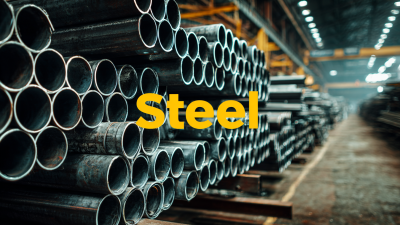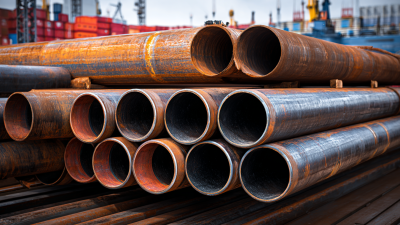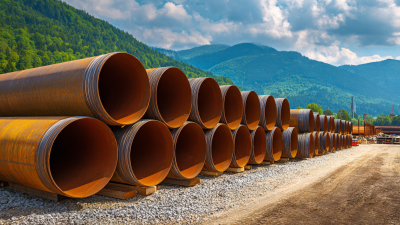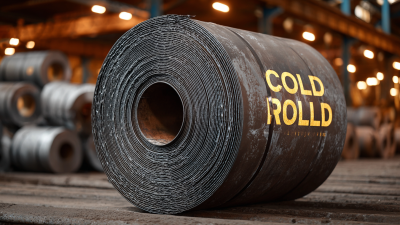In recent years, the innovation surrounding Round Pipe technology has spurred significant advancements across various industries, transforming traditional manufacturing and distribution processes. According to a report by Grand View Research, the global market for piping systems is projected to reach $200 billion by 2025, driven by rising demand for efficient and durable infrastructure solutions. As industries embrace new materials and designs, Round Pipe innovations have emerged as a key strategy to enhance performance, reduce costs, and improve sustainability. For instance, the integration of advanced manufacturing techniques and smart technologies has enabled the production of lightweight and corrosion-resistant pipes, thereby increasing their application in sectors such as construction, oil and gas, and water distribution. As we delve into the top strategies for harnessing these innovations, it becomes clear that Round Pipe technology not only holds the potential for operational excellence but also paves the way for a more sustainable industrial future.

The evolution of round pipe manufacturing techniques and technologies has significantly reshaped various industries, from construction and automotive to aerospace and energy. According to a report by Grand View Research, the global round pipe market is projected to reach $162.47 billion by 2027, driven by innovations in material science and manufacturing processes. Advanced techniques such as seamless pipe production and automated welding are enhancing the efficiency and quality of round pipes, ensuring they meet stringent industry standards.
Recent advancements in technology, including the adoption of automated inspection systems and digital twins, are further transforming the manufacturing landscape. A study by the International Journal of Advanced Manufacturing Technology noted that such technologies can reduce inspection time by up to 30%, leading to significant cost savings and increased throughput. Moreover, the integration of sustainable manufacturing practices is becoming critical, with a growing emphasis on using recycled materials and reducing energy consumption during production. This shift not only helps industries meet regulatory requirements but also supports a circular economy, paving the way for a more sustainable future.
In an era where sustainability is paramount, the future of round pipe innovations is increasingly focused on the integration of eco-friendly materials. As industries evolve, the demand for sustainable solutions has prompted manufacturers to explore alternatives to traditional materials, such as plastic and metal. Bio-based polymers, recycled composites, and even optimized designs that reduce material use are being researched and implemented, providing a pathway to a more environmentally conscious manufacturing process. These materials not only lessen the carbon footprint but also enhance the lifecycle of round pipe applications across various sectors, including construction, plumbing, and automotive.
Tip: When considering sustainable round pipe materials, it's essential to evaluate the supply chain and the sourcing of raw materials to ensure that they are not only eco-friendly but also ethically produced. This can lead to a more robust and responsible product offering.

Another innovation in this space is the use of advanced manufacturing techniques that allow for the production of lighter and more durable pipes. Techniques like 3D printing and additive manufacturing not only minimize waste but also enable customization that meets specific industry needs while adhering to sustainability goals. These innovations are set to transform the landscape of round pipe applications, ensuring they meet the demands of a future focused on environmental stewardship.
Tip: Always look for certifications and standards that verify the sustainability claims of new materials. This can help in making informed decisions that align with both performance and eco-consciousness.
The world of round pipe solutions is experiencing a revolution driven by innovative design trends that cater to the evolving needs of various industries. As sectors such as construction, automotive, and manufacturing advance, the demand for more efficient, durable, and aesthetically pleasing round pipes has surged. Designers are now focusing on creating pipes that not only fulfill their functional requirements but also align with sustainability goals. This shift includes the incorporation of eco-friendly materials and optimized production techniques that minimize waste and reduce environmental impact.
Furthermore, advancements in technology are paving the way for smart round pipe systems equipped with sensors and IoT capabilities. These innovations enable real-time monitoring of stress, flow, and temperature, enhancing the safety and efficiency of infrastructure. Such smart solutions are particularly valuable in industries like oil and gas, where monitoring and maintenance are critical. As we look to the future, the blend of cutting-edge design and technology will undoubtedly reshape how round pipes are perceived and utilized, making them indispensable components in the drive towards more sustainable and efficient industrial practices.

The evolution of round pipe innovations is making a significant impact across various industries, showcasing transformative solutions that have elevated efficiency, durability, and sustainability. For example, the construction sector is increasingly adopting advanced round pipe materials, such as high-density polyethylene (HDPE), which are lighter yet stronger than traditional options. This shift not only reduces transportation costs but also speeds up installation times, leading to more agile project completions and greater resource efficiency.
In the energy sector, round pipe innovations are revolutionizing how resources are transported and utilized. Specifically, the deployment of insulated round pipes in thermal energy systems helps to minimize heat loss during transmission, which is crucial for boosting overall operational efficiency in power plants. Additionally, the use of corrosion-resistant materials extends the lifespan of pipelines, ensuring they can withstand harsh environmental conditions while reducing maintenance costs. These case studies illustrate how round pipe advancements are driving positive change, enabling industries to become more efficient and sustainable in their operations.
| Industry | Innovation Type | Benefits | Case Study Example |
|---|---|---|---|
| Construction | Lightweight Materials | Reduced transportation costs | New building projects |
| Manufacturing | Corrosion-resistant Coatings | Increased lifespan of pipes | Heavy machinery and equipment |
| Energy | Smart Pipe Technologies | Enhanced monitoring and efficiency | Renewable energy setups |
| Agriculture | Irrigation Technologies | Water conservation | Smart farming operations |
| Automotive | Automated Welding Techniques | Improved quality and efficiency | Vehicle assembly lines |
The integration of smart technology in round pipe production is reshaping industries, leading to heightened efficiency and innovation. According to a recent report by MarketsandMarkets, the smart manufacturing market is projected to grow from $320 billion in 2023 to over $700 billion by 2028, demonstrating the critical intersection of technology and manufacturing. This transformation allows for real-time data analytics and predictive maintenance, ensuring that production processes are not only streamlined but also environmentally sustainable.
To leverage these advancements, manufacturers should consider incorporating IoT-enabled devices into their operations. These smart devices gather data from machinery and production lines, allowing companies to monitor performance continuously. For instance, integrating sensors that track the temperature and pressure of the pipe production process can lead to significant reductions in waste and energy consumption, as stated in a recent report by McKinsey & Company.
Tip: Invest in employee training programs focused on smart technology integration. Empowering your workforce with the skills to adapt to new systems will enhance productivity and foster a culture of innovation. Embrace continuous improvement by regularly reviewing and updating your technology to stay competitive in an evolving landscape.









